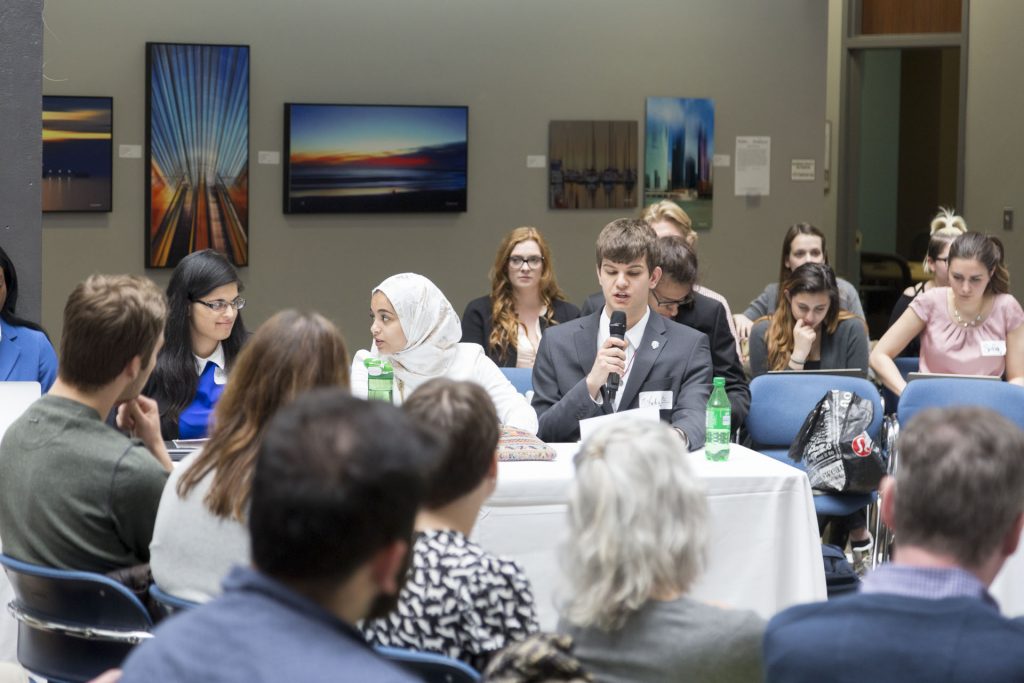Students in experiential class re-make history

In 1968, Canadians elected Tommy Douglas prime minister and brought his seven-year-old New Democratic Party into power, ushering in an era of strengthened powers for organized labour, stricter pollution controls and expanded rights for French-speaking Canadians.
At least, that’s what would have happened if Jennifer Tunnicliffe’s 2V03 history class had their way.
Dubbed “Re-making History,” 2V03 is an experiential history course designed to encourage both history and non-history students to engage with Canadian history – traditionally seen as a “dry, dull field” – in a different way.
“In every term this course is taught, we pick a different moment in Canadian history,” explains Tunnicliffe, who is a Wilson Assistant Professor with McMaster’s Wilson Institute for Canadian History. “This semester, we selected the 1968 federal election, with Trudeaumania and the “Just Society” and all the excitement around that. A big focus is to get students not just to look at 1968 from the perspective of 2018 – 50 years later – but to try and get a sense of what it was like to be in 1968.”
To do that, the class was divided into three groups at the beginning of the year – one group that represented the social democratic left, one centrist and one socially and politically conservative. Their job: to understand and eventually communicate the domestic and global issues of the day from the perspective of their group, regardless of their own political leanings.
“A lot of history courses cover a really broad time period,” says Alicia Davis, a second-year student in the Justice, Political Philosophy and Law program. “This one is completely different because of the participation, and how involved you get in the time period that you’re studying. We’ve had a chance to get a really in-depth understanding of the issues that were specific to Canada in the ‘60s.”
The culminating activity for the class was two-fold: students had to prepare an individual project that explores a particular issue from their assigned perspective. While traditional papers and academic posters were certainly acceptable, Tunnicliffe says students were encouraged to get creative.
“Students did art installations, wrote music, created campaign videos and built dioramas,” she says. “We’re trying to show them that it’s possible to present this info in many different ways.”
As well as their individual projects, students also had to represent their group’s perspective in a mock election debate – after which the students and audience voted in a mock election.
Preparing for the debate involved a lot of digging through primary sources – materials from the time that could inform how the students presented their issues.
“For the debate, we looked at the NDP party platform of 1968,” explains Jordan Zivanovich, a second-year honours history major who was representing the NDP in the debate. “We also looked at the platforms for the other parties as well as bills that the Liberals introduced under Lester B. Pearson. We’re going to try and show how issues like Indigenous rights, Quebec sovereignty and oil in the west have been neglected, and the negative impact that’s had on Canada.”
That research paid off. Although the 1968 Liberals may have swept to power on a wave of Trudeaumania in real life, the McMaster NDP was the clear winner in 2V03’s alternate reality.
For Ian McKay, McMaster’s L.R. Wilson chair in Canadian history and the person who introduced the course to McMaster last year, 2V03 is a chance to prove that Canadian history is “not dull as dishwater, but a vibrant, exciting subject.”
“This kind of class is geared towards students who want to do things, rather than just read about them,” he said before the debate started. “This course invites you to engage in a debate, to engage with conversations with fellow students – to throw yourself right into it. That’s very different from reading 15 different history books and memorizing facts for an exam. As you can see from the energy in the room, it’s got a completely different vibe.”


